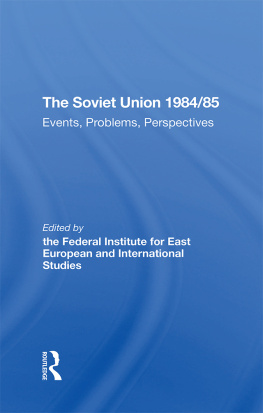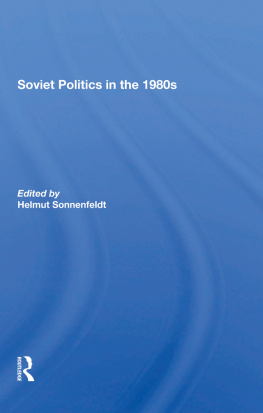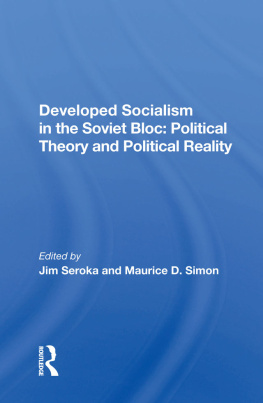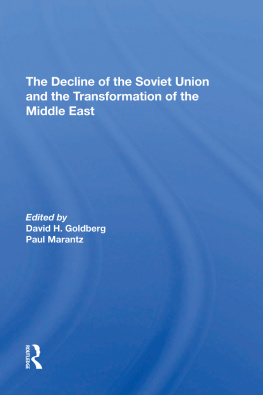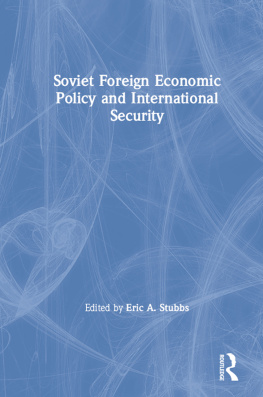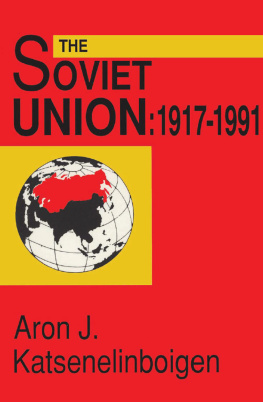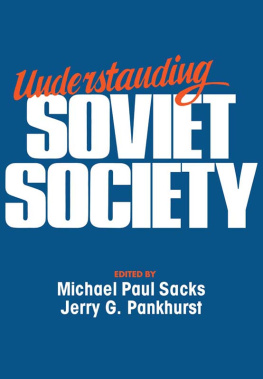About the Book
In 1984 and 1985, the swift succession in the USSR's leadership affected all levels of Soviet society. This eighth volume in a series of biennial reports on the Soviet Union analyzes domestic affairs, economics, and foreign policy in light of that succession. Power struggles within the highest echelons of the Soviet communist party are examined. Contributors evaluate prospects for the attempted economic modernization in a system that leaves little room for radical reform. Moscow's swings between extremes of self-isolation and readiness to talk raise questions about foreign and security policy during die transitional period. The contributors also identify perspectives, priorities, and trends for the future of Soviet politics, economics, and social developments.
The Federal Institute for East European and International Studies in Cologne was established in 1961 as an academically autonomous research institution. It operates under the administrative and financial authority of Germany's Federal Ministry of the Interior.
Published in cooperation with das Bundesinstitut fr ostwissenschaftliche und internationale Studien/ the Federal Institute for East European and International Studies
First published 1986 by Westview Press
Published 2019 by Routledge
52 Vanderbilt Avenue, New York, NY 10017
2 Park Square, Milton Park, Abingdon, Oxon OX14 4RN
Routledge is an imprint of the Taylor & Francis Group, an informa business
Copyright 1986 by the Federal Institute for East European and International Studies
All rights reserved. No part of this book may be reprinted or reproduced or utilised in any form or by any electronic, mechanical, or other means, now known or hereafter invented, including photocopying and recording, or in any information storage or retrieval system, without permission in writing from the publishers.
Notice:
Product or corporate names may be trademarks or registered trademarks, and are used only for identification and explanation without intent to infringe.
Library of Congress ISSN: 0163-6057
ISBN 13: 978-0-367-29607-0 (hbk)
Not only the informed layman but even the university student and the professional scholar, journalist, reference librarian, and government specialist are bound to have difficulty keeping up with the changing Soviet scene. This is but a more extreme case of the more general phenomenon regarding states and societies where access to information is controlled and available data are incomplete or unreliable; it is essential for the observer to have a grounding in the political context, the political culture, and the political jargon to understand the course of events.
What can we do to bridge the gap? Although the US reader has the opportunity to consult authoritative translations from the Soviet press and, selectively, from Soviet radio and television, The work of certain other research institutes is perceived to reflect special political pleading or the views of particular opinion groups and, perhaps, to suffer from some unwitting selectivity of data. The products of such organisations all deserve to be studied and consulted by the serious student. But none alone quite does the job.
All these considerations make the appearance in English of the present volume and others in this series particularly welcome. Das Bundesinstitut fr ostwissenschaftliche und internationale Studien (the Federal Institute for East European and International Studies) in Cologne has in the past decade emerged as perhaps the leading West European research center on the contemporary Soviet Union and Eastern Europe. Its papers and studies stand out by their factual reliability and the objectivity of analysis. Its staff is remarkably well informed, and although the interpretation of Soviet trends is always a matter of some intuition and subjective judgment, we can feel secure in the knowledge that in this instance the judgments are made by a team of skilled, informed, and seasoned specialists, without ax-grinding or political preconceptions.
The latter is particularly important in recommending a West German perspective to the US reader. On most matters of broad interpretation of Soviet developments, North American and West German specialists are normally very similaror rather, normally show roughly the same spectrum of divergent opinions. But on a few issuesbe it foreign trade or the prospects for change in the Soviet systemthe German, or more generally the West European, perspective is at times apt to differ from that of Washington. At the very least it deserves a serious hearing. At times, it has proven far more accurate than the US view; on other occasions, it has served as a useful corrective.
The present volumethe eighth in this biennial seriesprovides, as it were, a benchmark at the start of the Gorbachev era. The contributors review, topic by topic, the developments in Soviet domestic politics, the economy, and foreign policy during the interregnum between Brezhnev and Gorbachev. They analyze debates among the Soviet elite, successes and failures, pressures and constraints, and the options open to the decisionmakers. One can of course dispute some of the views expressed in the various contributions to this volume; in fact, some of the contributors may well disagree with each other. But the thoroughly documented picture of the USSR as it emerges from these pages is valuable not only because of what it offers the reader but also because it avoids several frequent and characteristic missteps and misconceptions.
The authors and editors are seasoned enough not to be taken in naively by Soviet assertions and statistics. Economic growth rates and social tensions are just two examples of areas where foreign specialists must reach their own independent conclusions, though naturally using Soviet information wherever they can.
At the same time, the contributors avoid the two equally inaccurate images of the Soviet Union as either "ten feet tall" or on the verge of crisis and collapse. Both of these views, in large measure ideologically driven, have in fact rendered a serious disservice to those who wish to deal earnestly and realistically with the Soviet challenge.

